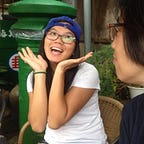02/11 Exploratory Research Synthesis
Findings & Design Principles
We began our meeting on Saturday by updating our Post-it note collection and sorting them into buckets we’ve been creating over the last week.
A summary of the research we’ve done so far:
- Observation and participation: Small Talk at the Intercultural Communication Center (ICC), Korean Class for Beginners, La Escuelita Arcoiris, Spanish Conversation Club
- Language acquisition expert interviews: Peggy & Rebecca at the ICC, Bonnie Youngs (French professor, taught in MA Second Language Acquisition), Candace Skibba (Spanish professor, teaches in MA Second Language Acquisition), Megan Rooney (Founder and director, La Escuelita Arcoiris)
- Language and cultural teacher interviews: Gang Liu (Chinese professor), Julia (English tutor at the GPLC), Jonathan (ESL tutor with refugees in Pittsburgh)
- Language and cultural learner interviews: Jonathan (Arabic/French), Leah (English), Stacie (German), Sarah (Tonga)
- Secondary research: The Routledge Encyclopedia of Language Teaching and Learning, The Routledge Handbook of Second Language Acquisition, The Routledge Handbook of Language and Intercultural Communication
- Ongoing online diary studies
We decided to work on our research synthesis as we went to externalize our learnings from each event before they got confused and forgotten. It helped us see patterns emerge early on. We rearranged the buckets a couple different times throughout the week in hopes of not basing our findings off only our first few interviews and using the rest to merely affirm our early hunches.
Our final buckets were:
- History
- Cultural differences
- Definition of success
- Relationships as motivation
- Types and methods of learning
- Teaching tips and methods
- Teachers’ perspective
- Immersion
- Learning motivation
- Societal differences
- Tech
- Classroom and self learning
- Language and culture
During our research methods class, we also tried a rose/thorn/bud sorting method that Tracy and Lisa taught us, marking some stickies with red stickers (current highlight moment, should keep/capitalize on this), blue stickers (current pain point, should ameliorate this), and green stickers (current area of potential). However, this exercise wasn’t really helpful to us in the stage we were in during that class session. We had a lot of trouble defining the roses, thorns, and buds for ourselves, since we hadn’t explicitly heard about pain points and highlight moments. We also had already begun sorting and the layering of information was becoming too much.
Instead of adding another layer of information to our stickies, we turned our buckets into broad finding statements that we just wrote out on another whiteboard.
The findings we wrote up on the board were:
- Relationships are key for learning and retaining new languages (putting it into use, motivation)
- What you learn needs to be relevant for it to stick
- Benefits of immersion: relevance, contextualizing, opportunity for developing skills/fluency/confidence, can’t escape the language, learn from the linguistic landscape.
- Success is determined by being able to express your ideas confidently and comfortably, not by being perfect
- Language and culture cannot and should not be separated
- Language has power
- Context!
- Tech can support interactions over time and space
- Tech should be supported by pedagogy
- Critical thinking to understand culture and gain skills, habits
- Give feedback in a specific and safe environment — how can we correct without lowering confidence?
- How can we create and sustain motivation? Show growth, progress; Traveling and building relationships; Interest in some part of culture
- Can we alleviate culture shock/bias by bringing expectations of cultural differences beforehand? Feelings of fear, loneliness, stress
- Good ways to learn — practice! Put it into use!
- Don’t be afraid of making mistakes
- Classroom learning — grammar, pronunciation, etc. doesn’t help a lot with interacting with people
- Need to vary ways of learning
- Limited by time and cost
- Integrativeness: notion of identity — willingness/desire to be like valued members of the community
We then turned these bullet points into design principles:
- Use meaningful interactions to build relationships
- Build confidence with contextual practice
- Give supportive feedback
- Expression, not translation
- Embody language and culture
- Encourage conscious critical thinking
